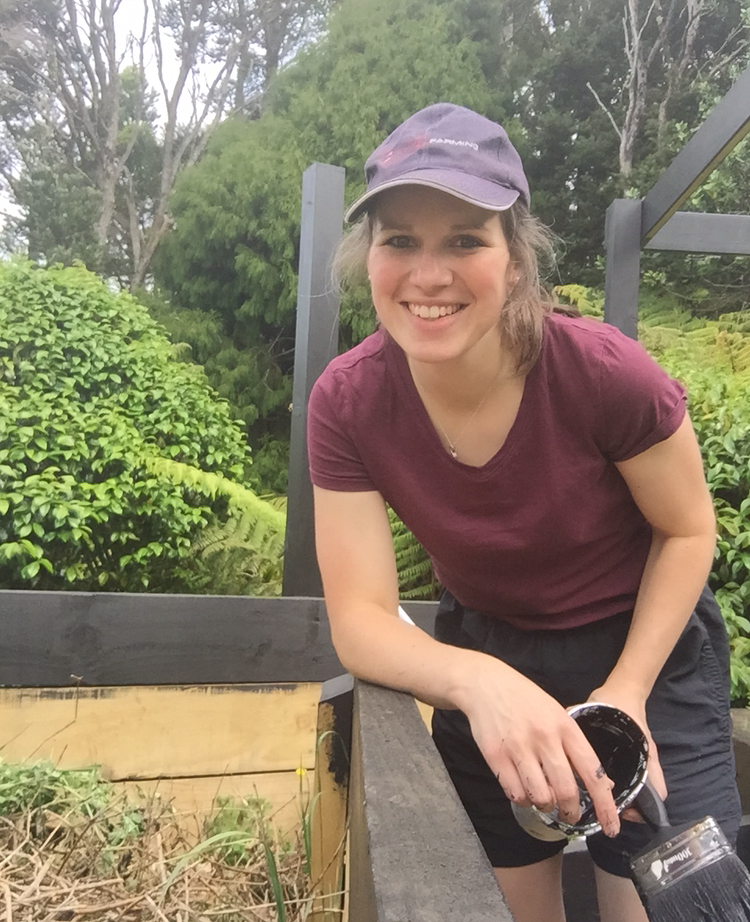Amy McCaughey-Chapman is one of the lead researchers in our new Spine Squad. She currently has two international patent applications pending. One is for a protocol she’s developed relating to spinal nerve regeneration. Key to healing spinal cord injury.
Amy was born in France to an Irish Mum and English Dad. She grew up speaking French at school and English at home. So, maybe that’s why her accent is so neutral. Occasionally you hear the hint of some other language. But it’s subtle and her predominant inflection now is Kiwi.
Amy’s family migrated here when Amy was 16 years old. She remembers it as a big adjustment. But it was a relief to get away from the bullying she’d experienced in the French schoolyard. Now, as a Mum with a family of her own, she can’t see herself living anywhere else.
“It was really by chance that I ended up in this field,” says Amy. “When I first enrolled at Auckland Uni, my family challenged me to mix up my degree a bit. After all, they asked, ‘What was I going to do with a maths degree.’ So, there I was, leafing through the UoA brochure looking for ideas and enrolment was closing. I spotted Pharmacology. That looked interesting. I ticked the box.
That was the beginning. Just a couple of neuroscience papers to fill a gap. By the time I finished my first degree, I was hooked. Maths was cool but the brain was cooler.
My shift in interest to the spinal cord came later and was more personal. One day, towards the end of my PhD, Mum rang. “Can you go across the road to Auckland Hospital?” she said. “Your sister’s in A&E. She’s had a fall, but I think she’s ok. Just a little concussed maybe.”
I walked into the Emergency ward to find my sister in a full-body brace. She looked at me. She was crying. And I knew this was not ok. She was paralysed.
To this day the doctors don’t really know what she did. They thought she may have damaged her spinal cord or possibly the brain stem? They now think it was some sort of protective response to her fall. Her body had simply shut down. We didn’t know that then. Two frightening days passed. Then, thankfully, she started to regain feeling in her legs. She was going to be ok.
It had been a huge shock for us all. And it made me think about how quickly our lives could have changed. Not just for my sister, but for our whole family. I remember thinking, ‘I need to move more into the spinal cord field.’ It was soon after that when I came across oligodendrocytes.”
Oligodendrocytes are crucial to nerve function in the brain and spinal cord. Amy’s research is groundbreaking. Her work will have significant implications for spinal cord injury and neurodegenerative diseases like Huntington’s Disease and Multiple Sclerosis.
Amy has two international patent applications pending for protocols related to oligodendrocytes. One of them will help bring us closer to a cure for spinal cord injury. They are the foundations of further research and a vital piece of the puzzle. They’ll be used, and built on, by other researchers here and around the world.

Amy’s is a rare intellect. She’s a mathematician at heart. She often refers to her ‘mathematical brain’. It’s a bonus in research. Statistics are her comfort zone. She sees patterns in the pieces before her and visualises the connections between them.
She’s also a Mum – and that’s important to her too. “My husband and I have our own family now. I love being in the garden. My son helps me dig for veggies. We ride the train together every morning and watch for trucks and diggers.
This is such a great place for us to be a family, and, watching my son’s brain develop in real time… well, I think it makes me a better researcher. I’m more rounded, more open to ideas – because I’m a Mum. Because we live real lives.
New Zealand is unequivocally home,” she says. “Sure, the traffic in Auckland is horrible, but it is everywhere. We love it here. I know it is possible to have it all. I can be a Mum. I can be an important and influential researcher. And I can do it all here.”
Kiwi researchers like Amy are leading the world. Right here, right now! But they need your help.
Please support spinal cord research being done here in New Zealand. Make your donation today.
Make a difference, today.
Thank you.
